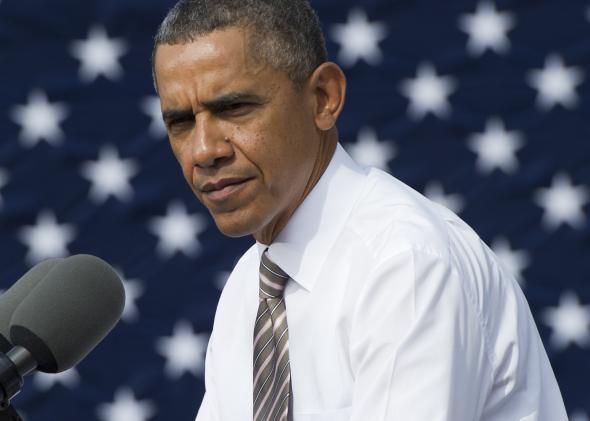“The Original Sin of Obamacare: The law’s implementation has been perilously delayed for the sake of a dumb talking point,” by Matthew Yglesias. Why has the start of the main portions of Obamacare, which passed in 2010, been delayed so much already? Part of the answer lies in the administration’s desire to reduce the cost of the program over the next 10 years, since that’s the length of time the Congressional Budget Office uses when projecting government costs—a gambit which Yglesias argues was too clever by half. “Delaying the rollout of a massive spending program to try to make it look a little less massive was dumb,” writes Yglesias, “and part of what’s happening today is that Democrats are paying the price for it.”
“Why the Shutdown Looks So Bad for the GOP: Not only are they taking the blame, but the Republican party’s divisions, fissures, and personal animosities are taking center stage,” by John Dickerson. Public opinion polls show overwhelming opposition to the Republican strategy that has led to the government shutdown. But the shutdown has done more than turn public sentiment against the GOP. It has also exposed and highlighted the party’s fault lines.
“If It Happened There … the Government Shutdown,” by Joshua Keating. Keating appropriates the tropes and tone that typifies American media coverage of foreign government crises in his cheeky piece on the U.S. government shutdown. “The current rebellion has been led by Sen. Ted Cruz, a young fundamentalist lawmaker from the restive Texas region, known in the past as a hotbed of separatist activity,” he writes. Keating’s piece makes you want to laugh and cry at the same time.
“The End of the Reasonable Observer: The 2013 term at the Supreme Court may prove the last gasp of Sandra Day O’Connor’s legacy,” by Dahlia Lithwick. What will happen to Supreme Court precedents on abortion, affirmative action, campaign finance reform and church/state separation that Sandra Day O’Connor, the court’s “reasonable observer,” helped implement? A question looming over the October 2013 term is whether O’Connor’s legal architecture, which has already been largely eroded, will continue to be dismantled by the Roberts Court.
“Keep the Change: Giving money to child beggars is the least generous thing a tourist can do,” by Jillian Keenan. Giving $10 to a young beggar in India “might be among the most destructive things I’ve ever done,” writes Keenan. It’s bad enough that travelers who give money to child beggars perpetuate a cycle of poverty and incentivize children to stay out of school. Organized begging is also one of the most visible forms of human trafficking, writes Keenan, and it’s largely financed and enabled by good-hearted people who just want to help.
“Who Is the Most Beautiful Woman in the World: Not Gwyneth Paltrow,” by Simon Doonan. People magazine missed the mark by declaring Gwyneth Paltrow to be the most beautiful woman in the world, Doonan argues. Paltrow maintains her beauty by “thrashing around a gym morning noon and night … and eating nothing but plankton and kale juice.” In contrast, Doonan writes, the title should be bestowed on someone living her life full-throttle “à la Liz Taylor.”
“Cool Story: What does “cool” even mean in 2013?” by Carl Wilson. Often credited to sax player Lester Young in the 1940s, the term cool was in general circulation by the mid-1950s, with Miles Davis’ Birth of the Cool and West Side Story’s eponymous, finger-snapping gang credo. Wilson wonders what is cool in 2013, why are we still using this term for what scholar Peter Stearns pegged as “a twentieth-century emotional style,” and how has the concept somehow remained evergreen as words like groovy, rad, or and fly have fallen by the wayside
“The Most Ingenious Attack on Gay Marriage Bans: It’s a new lawsuit in Pennsylvania, and it’s likely to succeed,” John Culhane. Palladino v. Corbett, a case filed in federal court in Philadelphia last week, is the first case to attack a state law that declares a same-sex marriage from another state “void.” If legal challenge succeeds, as Culhane predicts, it will effectively tear down the whole edifice of refusing to recognize same-sex marriage and serve as a model for suits across the country.
“Breaking Bad, Season 5, Part 2, Week 8: In the end, Breaking Bad was a brutal show—about love,” by Emily Bazelon. Following Breaking Bad’s series finale, Bazelon memorializes the five-season show about a high school chemistry teacher’s dark ascension to the apex of the southwestern U.S. meth trade as a near-perfect execution of precise plot, vivid character portraiture, taut dialogue, mordant wit and photography that’s eerie and ordinary and beautiful in places. “But until the finale Sunday, I never thought of this as a show that was made with love—or that took love as its central theme,” she writes.
